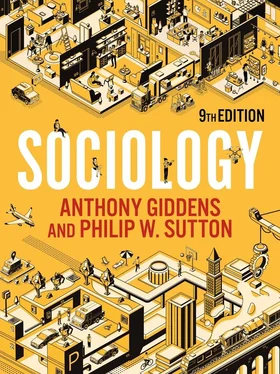Of course, others disagree. Those adopting a broadly culturalist position argue that globalization does depend on the continuing integration of the world economy, but that this is achieved in various cultural, not purely economic ways. Tourism is a huge ‘industry’ around the world, and in 2017 some 1.34 billion international tourists spent US$4.44 trillion in countries other than their own (World Bank 2017). The desire to travel and experience new sights and cultures is not a purely material interest but is influenced by the shifting cultural tastes of tourists, what Urry and Larsen (2011) call the ‘tourist gaze’. This thesis is outlined in ‘Global society’ 4.2.
Waters (2001) argues that the realm of culture is crucial to globalization because it is through cultural and symbolic forms that economic and political developments are freed from the material constraints of geography. For instance, the so-called weightless economy is one in which products have their base in information, such as computer software, and media and entertainment products, such as games, films, music and online streaming services. This new economic context is often characterized as the ‘knowledge society’ or ‘the information age’. The emergence of a knowledge society is linked to the development of a broad base of technologically literate consumers who integrate advances in computing, entertainment and telecommunications into their everyday lives. Perhaps the best example is online gamers, who await the latest games and updates with eager anticipation and, of course, are prepared to pay for them.
This ‘electronic economy’ underpins the broader economic globalization. Banks, corporations, fund managers and individual investors are able to shift funds internationally with just a click. The ability to move electronic money instantaneously carries with it greater risks. Transfers of vast amounts of capital can destabilize economies, triggering international financial crises, and, as the global economy becomes ever more tightly integrated, a financial collapse or disaster in one part of the world can have an enormous effect on distant economies. The 2008 global financial crash is perhaps the best example of this, as the crisis quickly spread outwards from the USA into the rest of the global economic system.
The operation of the global economy reflects changes that have occurred in the information age. In order to be competitive, businesses and corporations have restructured to become more flexible and networked rather than hierarchical, as in older bureaucratic organizations (Castells 1996b). Production practices and organizational patterns have become more flexible, partnering arrangements with other firms are more commonplace, and participation in worldwide distribution networks is essential in rapidly moving global markets.
Global society 4.2 International tourist interactions
Have you ever had a face-to-face conversation with someone from another country or connected to an overseas website? Have you ever travelled to another continent on business or for a holiday? If you answered ‘yes’, then you have experienced one of the consequences of globalization. Globalization has changed both the frequency and the character of interactions between people of different nations. The historical sociologist Charles Tilly defines globalization in terms of these changes. According to Tilly (1995: 1–2), ‘globalization means an increase in the geographic range of locally consequential social interactions.’ In other words, a greater proportion of our interactions come to involve, directly or indirectly, people from other countries.
Globalization has greatly expanded the possibilities for international travel, both by encouraging an interest in other countries and by facilitating the movement of tourists across borders. High levels of international tourism translate into an increase in the number of face-to-face interactions between people of different countries. John Urry (2002; Urry and Larsen 2011) argues that the ‘tourist gaze’ – the expectations on the part of tourists of what they will experience while travelling abroad – shapes many of these interactions.
Urry compares the tourist gaze to Foucault’s conception of the medical gaze (see chapter 10, ‘Health, Illness and Disability’). He argues that the tourist gaze is just as socially organized by professional experts, just as systematic in its application and just as detached as the medical gaze, but this time in its search for ‘exotic’ experiences. These are experiences that violate everyday expectations about how social interaction and interaction with the physical environment are supposed to proceed.
Yet, apart from those seeking out extreme experiences, most tourists do not want their experiences to be too exotic. A popular destination for young travellers in Paris, for example, is a McDonald’s restaurant. Some go to see if there is any truth to the line from Quentin Tarantino’s movie Pulp Fiction that, because the French use the metric system, McDonald’s ‘quarter pounder with cheese’ hamburgers are called ‘Royales with cheese’ (it is true). Britons travelling abroad often cannot resist eating and drinking in comfortable British- and Irish-style pubs. It is these contradictory demands for the exotic and the familiar that are at the heart of the tourist gaze.
The tourist gaze may put strains on face-to-face interactions between tourists and locals. Locals who are part of the tourist industry may appreciate the economic benefits, but others may resent tourists for their demanding attitudes and the overdevelopment that occurs in popular destinations. As with most aspects of globalization, the overall impact of these intercultural encounters has both positive and negative consequences.
How do your own travel plans and the infrastructure required for tourists damage the country’s ecosystems ? Do the cultural benefits of global tourism outweigh the environmental damage caused?

McDonald’s has fast-food restaurants around the world, including here in Marrakech, Morocco, which adjust the menu and setting according to local cultures.
Transnational corporations
Among the many economic factors driving globalization, the role of transnational corporations is especially important, despite their relatively small number. Transnational corporations (TNCs) are companies that produce goods or market services across several countries. These may be relatively small firms, with one or two factories outside their home country, or gigantic international ventures whose operations criss-cross the globe. Some of the biggest transnational corporations are companies known all around the world, such as Walmart, Apple, Amazon, ExxonMobil, Nestlé and Alphabet (the parent company of Google). Even when transnational corporations have a national base, they remain oriented towards global markets and profit-making.
Transnational corporations became increasingly significant after 1945. Expansion in the initial post-war years came from firms based in the United States, but by the 1970s European and Japanese firms increasingly invested abroad. In the late 1980s and the 1990s, TNCs expanded dramatically with the establishment of three powerful regional markets: Europe (the Single European Market), Asia-Pacific (the Osaka Declaration guaranteed free and open trade by 2010) and North America (the North American Free Trade Agreement). Since the early 1990s, countries in other areas of the world have also liberalized restrictions on foreign investment, and by the turn of the twenty-first century there were few economies in the world beyond the reach of TNCs. In very recent years they have expanded their operations into developing countries and Eastern Europe, with China providing the next major challenge and opportunity.
Читать дальше













